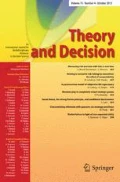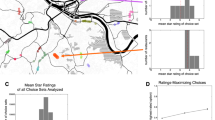Abstract
The rationalization of context-based choice is usually based on the assumption that preferences are context-dependent. In this paper, we show that context-based choice can be due to the characteristics of the choice procedure applied by the individual and not to the dependence of preferences (stochastic or deterministic) on the context. Our arguments are illustrated focusing on the much-studied dominated-alternative effects.
Similar content being viewed by others
References
Baharad E., Nizan S. (2000) Extended preferences and freedom of choice. Social Choice and Welfare 17: 629–637
Bandyopadhyay T., Dasgupta I., Pattanaik P.K. (1999), Stochastic revealed preference and the theory of demand. Journal of Economic Theory 84: 95–110
Caldwell B.J. (1983) The neoclassical maximization hypothesis: comment. American Economic Review 73: 824–830
De-Palma A., Myers G.M., Papageorgiou Y.Y. (1994) Rational choice under an imperfect ability to choose. American Economic Review 84(3): 419–440
Dhar R., Glazer R. (1996) Similarity in context: cognitive representation and violation of preference and perceptual invariance in consumer choice. Organizational Behavior & Human Decision Processes 67(3): 280–296
Huber J., Payne J.W., Puto C. (1982) Adding asymmetrically dominated alternatives: violations of regularity and the similarity hypothesis. Journal of Consumer Research 9: 90–98
Kalai G., Rubinstein A., Spiegler R. (2002) Rationalizing choice functions by multiple rationales. Econometrica 70(6): 2481–2489
Mellers B.A., Cooke A. (1994), Tradeoffs depend on attribute range. Journal of Experimental Psychology: Human Perception and Performance 20: 1055–1067
Luce D. (1959) Individual Choice Behavior. Wiley, New York
Osborne M.J., Rubinstein A. (1998) Games with procedurally rational players. American Economic Review 88(4): 834–847
Pettibone J.C., Wedell D.H. (2000) Examining models of non-dominated decoy effects across judgment and choice. Organizational Behavior and Human Decision Processes 81: 300–328
Rubinstein A. (1998) Modeling Bounded Rationality. MIT Press, Cambridge, MA
Sen A.K. (1993) Internal consistency of choice. Econometrica 61(3): 495–521
Simonson I., Tversky A. (1992), Choice in context: tradeoff contrast and extremeness aversion. Journal of Marketing Research 29: 281–295
Slovic, P., Griffin, D., and Tversky, A. (1990), Compatibility effects in judgment and choice, in Hogarth R. (ed.), Insights in Decision Making, Chicago, IL, pp. 5–27. The University of Chicago Press.
Tversky A., Sattath S., Slovic P. (1988) Contingent weighting in judgment and choice. Psychological Review 95: 371–384
Tversky A., Simonson I. (1993) Context dependent preferences. Management Science 39(10): 1179–1189
Wedell D.H., Pettibone J.C. (1996) Using judgments to explain decoy effects in choice. Organizational Behavior and Human Decision Processes 67: 326–344
Author information
Authors and Affiliations
Corresponding author
Rights and permissions
About this article
Cite this article
Kriesler, K., Nitzan, S. Is Context-Based Choice due to Context-Dependent Preferences?. Theor Decis 64, 65–80 (2008). https://doi.org/10.1007/s11238-007-9033-7
Received:
Accepted:
Published:
Issue Date:
DOI: https://doi.org/10.1007/s11238-007-9033-7




